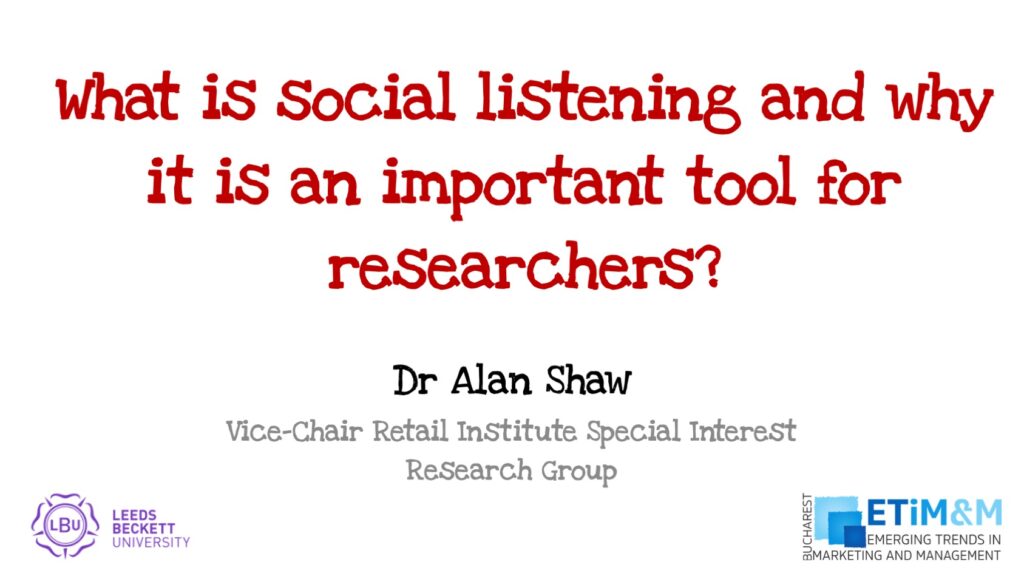
This video blog has been taken from a keynote speech I gave at the Emerging Trends In Marketing And Management conference earlier this month. The title is “What is social listening and why it is an important tool for researchers?” The video has been split into three sections, part one introduces the viewer to the concept of “social listening”, the second covers aspects that researchers need to consider when embarking on social listening, and the final section are examples of my published works. Hope you enjoy them.



The above videos focus on academic research. This section explains why it is also important for businesses too. The text is an extract from an article I wrote for Leeds Beckett University’s Retail Institute’s members magazine.
Social listening, why it is important for business?
Social listening is the practice of monitoring conversations and/or activities that are shared through electronic social channels. These channels can be social networks, discussion networks, professional networks, review networks, gaming networks, sharing economy networks, booking marking networks, blogging and/or publishing networks. If you have a presence on any of these platforms, then you will require a process that monitors and responds to comments, questions and requests about your brand and its services. Your response should almost be immediate because that’s what the public expects. To put this into context, you would not publish a business telephone number then never monitor it, so please consider all links to social platforms from your website as alternatives to telephone numbers and email addresses. It is a signal to the public (and other organisations) that they can contact you through them.
Social listening: the active and passive approach.
Before returning to the wider concept of social listening, let’s first define the meaning of listening: it is the process of receiving, constructing meaning from, and responding to spoken or nonverbal messages1. This means that social listening can be active or passive: the active process is where you would engage with others through the chosen network. The passive process is where you observe from afar, without participating in the conversation. If you are listening to customers or topics related to your products and services, then you should be active. If you decide to observe competitor activity then you should be passive, that said if there are ways that you can support your competitor’s clients (i.e., convert them to your own) then don’t be afraid to interject with a potential solution.
Social listening and market research.
Social listening is an ideal way of getting real-time market research data about your brand and services. First, you will need to decide what platforms you wish to focus on and what period would be appropriate. An example of one of our previous studies was the examination of the perceptions of smart meters in the UK2. We did this by reviewing the conversations on Mum’s Net (the UK’s biggest network for parents, with around 10 million unique visitors per month clocking up around 100 million page views). It looked at threads (conversations made through the forum) over a 12-week period, which yielded 727 posts from 670 different participants. We were then able to develop the posts into themes that could be used to shape product upgrades and future marketing communication messages.
You can also use it to review big data, another example of our research was the captured of over 70,000 tweets associated with “not drinking and driving” over New Year’s Eve3. This data exercise was completed in a 24-hour window. The findings demonstrated how poor our public bodies were poor at engaging with society on such an important topic. It also identified potential influencers that could be used to enhance the process.
Social listening and market intelligence.
Social listening can also be used for intelligence gathering. In this instance, you should be monitoring all the conversations relating to your competitors. As mentioned earlier such a process should be passive. There is an on-going debate about the ethical implications for this practice: as long as it is data presented is in the public domain then there should be no issue. As with your own brands/services you will be able to gauge the public’s attitude to these competitors, which should help in the development of future strategic plans.
The market intelligence review can also be used to identify “fake news”, copyright and intellectual property infringements. This type of review tends to be a more specialist process, where researchers would analyse big data through graph databases like Neo4j.
Conclusion.
The examples above demonstrate the importance of social listening. Our world is changing rapidly, and we can see that the use of social media through its various networks has become ubiquitous in every society. There has also been a growth in internet shopping with product discussions and reviews taking place through a variety of digital channels. Keeping a handle on the e-word of mouth conversations that are taking place should be a key priority for all businesses, it may even help identify potential influencers.
Despite all this, experience has shown us at the Retail Institute that many organisations are overawed by the enormity of managing the social listening process. We have several experienced researchers that can support and guide you through your journey into this new domain. If you would like to know more then drop us a line.
References:
- Trenholm & Jensen (2011), Interpersonal communication. Oxford University Press, Oxford, UK.
- Shaw, A (2020), Netnography and a summative content analysis approach to market research. Journal of Emerging Trends in Marketing and Management, 1 (1). pp. 12-22. ISSN 2537-5865
- Alan Shaw (2021), Promoting Social Change – Assessing How Twitter Was Used to Reduce Drunk Driving Behaviours Over New Year’s Eve, Journal of Promotion Management, 27:3, 441-463
Alan Shaw
Latest posts by Alan Shaw (see all)
- What is social listening and why it is an important tool for researchers? - July 31, 2021
- COVID-19 and Remote Learning: Experiences of parents supporting children with SEND during the pandemic. - June 30, 2021
- Using Netnography To Evaluate The Launch And Collapse Of The European Super League - April 21, 2021
- Developing Semi-Structured Interview Questions: An Inductive Approach. - April 9, 2020
- Developing Semi-Structured Interview Questions: A Deductive Approach - April 9, 2020













